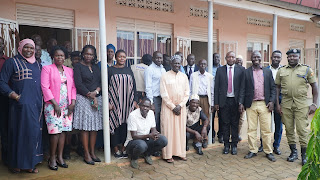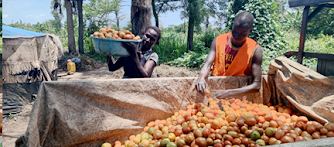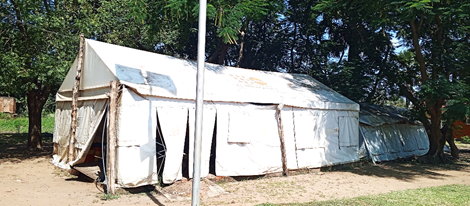DRDIP’s multi-sectoral approach will tackle GBV/VAC in refugee hosting districts
 |
| Participants during the GBV/VAC meeting Yumbe |
Jamal Kiira, the Yumbe District Senior Community
Development Officer in charge Gender, revealed that a total of 343 cases have
been reported since last year. Kiira was
attending a GBV/VAC stakeholders’ engagement meeting organized by the Office of
the Prime Minister’s(OPM), Development Response to Displacement Impacts Project
(DRDIP) Monday at Yumbe District Local Government headquarters.
Of the 343 cases recorded; defilement is the most
rampant at, 123 according to the district report, consequently followed by child
marriages at, 104. Physical abuse cases stand at 71, and forced marriages, 48. Other
cases include; psychological cruelty at 43, denial of resources at 17 and other
sexual exploitation cases such as rape is 10.
Supported by the World Bank, DRDIP is currently
introducing a GBV/VAC pilot project in selected districts of; Yumbe, Terego,
Madi-Okollo and Adjumani where findings from a consultant is being shared and
IEC materials disseminated. Different stakeholders are attending these engagements,
sharing experiences, reflections and recommendations.
Yumbe Chief Administrative Officer (CAO), Steven Oloya
while addressing the multi-sectoral meeting yesterday noted that, despite prevailing
absence of physical violence, GBV/VAC is a silent war that must be fought. Oloya urged stakeholders to shift from a
sector-based approach to a program based methodology, calling upon cultural,
religious institutions and police to integrate their ideas on how to reduce
cases of violence in the district.
The CAO recognized DRDIP as one of the most successful
Government projects partly because of mainstreaming several cross-cutting
issues including: environmental and social safeguards, livelihoods and
infrastructural reinforcement, adding that, “the aspect of GBV/VAC even deepens
the social safeguards facet”.
In her opening remarks, DRDIP Project Manager, Caro
Brenda Lorika pointed out that the GBV/VAC component will build capacity and
strengthen referral systems for victims. She called on the district leadership
to support resource persons deployed in their districts including consultants
by allocating them space and time to allow effective implementation of the pilot
project.
Ministry of Gender Labour and Social Development,
Senior probation Officer, Rogers Goloba advised participants to take advantage
of the child helpline, 116 that serves twosome role of reporting violence
against children and GBV. Goloba said the
district action centers were established to strengthen reporting to the
national center.
World Bank’s, representative observed that the project should be able to add value to what has already been done or what is being done, calling on the different stakeholders to be able to understand their roles and work collaboratively towards realizing a violence free community.
The official from the Bank revealed that more heartbreaking stories come from refugee hosting districts. “we
need to do something together to change this”, she said, stressing that it would
be better to mitigate the problem rather than responding throughout. “Broken
homes lead to broken communities, broken society, citizenry and to a broken
country”.
Yumbe Deputy Resident District Commissioner, Vuni Vuyaya remarked that, it’s everyone’s responsibility to fight GBV/VAC in the community. “Children innocently suffer most times because they have no choice of another home, we must mitigate such violence and set the children free. I know that we can’t eliminate it completely, but we can reduce the magnitude”, adding that, “change must begin with every one of us, and DRDIP has given us the opportunity to do this”.
The goal
of the GBV/VAC pilot project is to enhance capacity of
selected DRDIP districts to prevent, mitigate and respond to GBV /VAC
cases. The intervention covers: risk mitigation, prevention, response and generation of evidence
and learning to inform future scale-up efforts.



Comments
Post a Comment